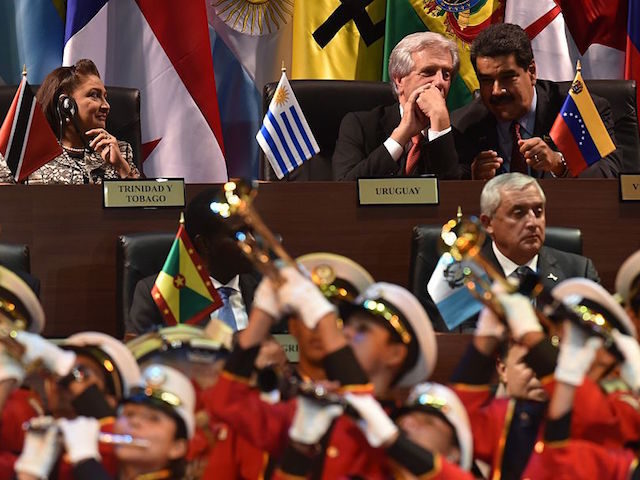Given the hostility from the U.S. and other Western countries, foreign allies matter a great deal to Venezuela. Luckily for the regime, a cheap supply of oil also matters a great deal to its allies.
I graduated from college and, due to a stroke of luck and series of unrelated circumstances, I found myself in a job abroad as part of the non-diplomatic personnel in one of Venezuela’s smaller embassies from 2010 to 2013; specifically, in a consular section. Due to a bad case of severe understaffing and budget cuts, I had to take several responsibilities with no extra payment and with an implicit 24/7 availability.
It wasn’t the best-paid job out there, but it was my first “real” job. I had a more direct look at how things worked in this “Revolution” through the three years that I worked in that desk: how the promise of cheap oil was used to purchase influence throughout the region (with programs such as Petrocaribe and ALBA) all whilst being masked under the pretense of “economic cooperation;” how vote-trading in international organizations such as the U.N. and the Organization of American States (OAS) worked; and how almost every “friendly” government would turn a blind eye to Venezuela’s antics or even be complicit as long as they got a slice of the sweet oil pie.
As the Middle East conflicts of the late 2000s gave forth to a rise in oil prices, late dictator Hugo Chávez found himself with an unprecedented oil bonanza — which he used to spread his influence and to one-up America in the region.
While I’m no career diplomat or anything, that work experience served to show me how Venezuelan diplomatic hires discarded any semblance of meritocracy and instead turned into a bizarre form of reward to the most loyal members of the regime’s ranks. Ambassadors, minister-counsellors, and the rest of the ranks were (and continue to be) assigned to high members of the regime. I call them “rewards” because the position does come with a not too shabby USD/Euro salary (in a country where the sheer majority earns less than $10 and with a strict currency control system), a luxurious life with all expenses paid, and a budget and annual operating plan all ripe for embezzlement and corruption.
There are also plenty of cases of diplomatic positions being assigned to men and women just because they happen to share blood with the right people. A prime example would be one of Hugo Chávez’s daughters, appointed as alternate ambassador to the UN in 2014. She’s currently living comfortably in New York as part of the Venezuelan mission to the U.N. that vehemently loves to denounce the “evil U.S. Empire” all whilst partaking in a state-sponsored luxurious life in the United States.
Chávez’s impending death threw the government’s politburo into an “every man for himself” situation towards the end of 2012. They rapidly “renovated” the diplomatic positions, replacing and filling vacant spots with themselves or their close ones as a safeguard measure. I was forced to resign due to “political differences” when a new boss arrived — I was more than happy to do so.
Just like with the media apparatus under their grasp, the regime has used diplomacy over the years to extend its influence and buy support through the region using our oil and resources but, unlike Chávez, Maduro doesn’t have access to that near-unlimited oil checkbook, so his diplomatic influence has waned recently.
Plus, twisting the truth and defending the absolute disaster of Venezuela’s socialism on a diplomatic level (or any level for that matter) has become quite impossible for them as of late — I’d be embarrassed and ashamed if I had to be part of that.
Nonetheless, the tendrils of the so-called “Bolivarian Diplomacy of Peace” continue to firmly grasp the fruits of their labor. Maduro’s regime is set to return to the United Nations Human Rights Council in 2020. Additionally, the regime’s diplomats have been accused of having had a hand in the recent wave of protests and riots that have occurred in other Latin American countries such as Chile and Ecuador, all of which seek to destabilize governments that aren’t ideologically aligned with Cuba and Venezuela’s socialism.
Juan Guaidó’s interim presidency managed to reclaim a handful of embassies and diplomatic posts in countries where Maduro’s regime has broken diplomatic relations, such as America and Colombia. The State Department backed an initiative of the opposition-led National Assembly this year that extends the validity of Venezuelan passports for an additional five years past their printed date of expiration. A much-welcomed measure, given the sheer difficulty of obtaining travel documents in this country — and how expensive they’ve become.
Beyond that, and with all of the budget and logistic limitations they currently face into consideration, these diplomatic outposts have failed to produce the expected results and provide the proper consular assistance to the ever-growing number of Venezuelan citizens that have decided to flee from the wonders of Socialism.
Christian K. Caruzo is a Venezuelan writer and documents life under socialism. You can follow him on Twitter here.
This article is the fifth in a series on life in Venezuela. Begin the series here.

COMMENTS
Please let us know if you're having issues with commenting.